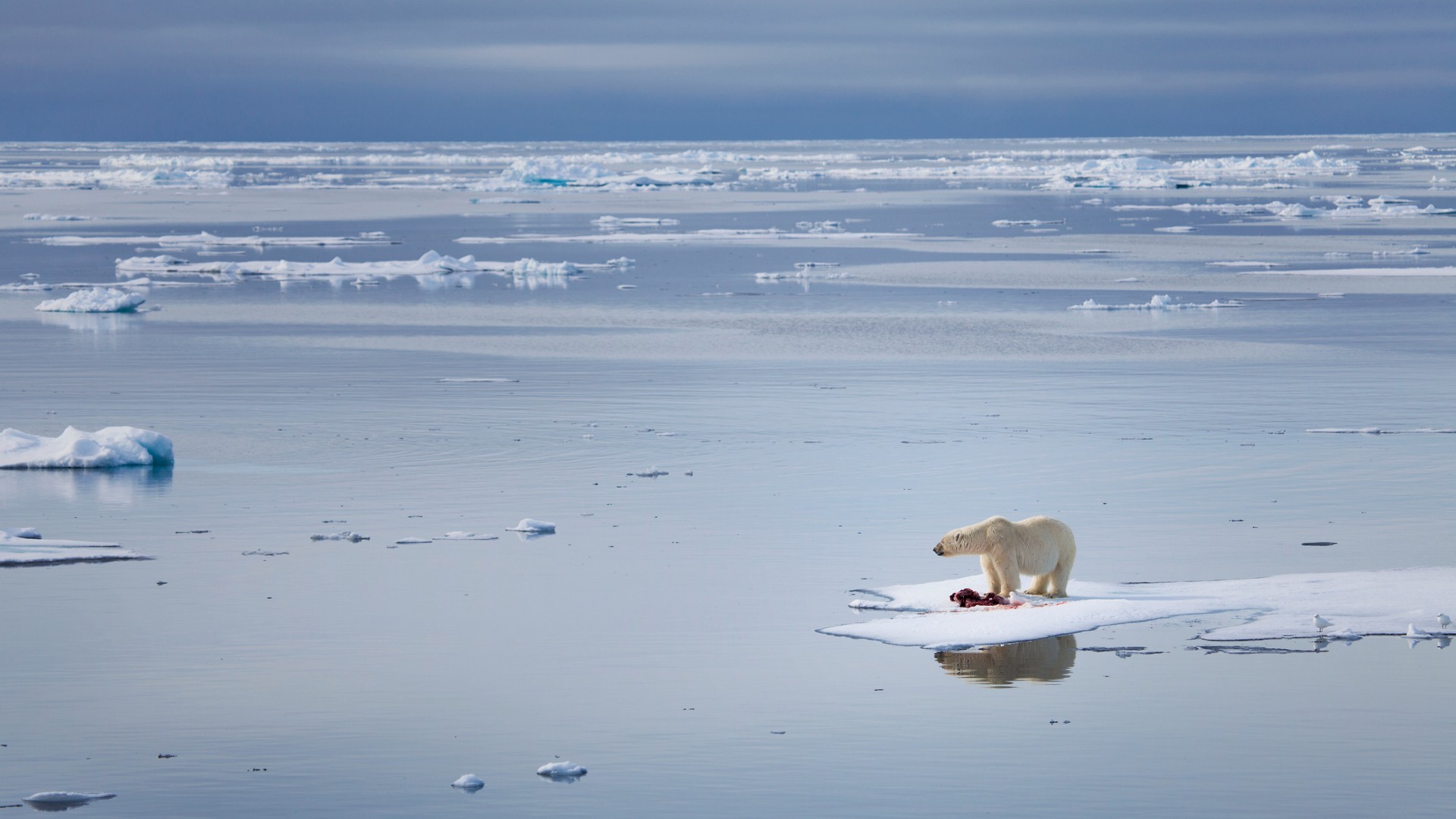'Ominous milestone for the planet': Arctic Ocean's 1st ice-free day could be just 3 years away, alarming study finds
The Arctic's ice cover could dip below a crucial threshold as soon as 2027, and will do so inevitably in the next 20 years if greenhouse gas emissions continue, scientists warn.

The Arctic Ocean could have its first ice free day as soon as 2027, an alarming new study reveals.
Arctic sea ice has been melting at an unprecedented rate of more than 12% each decade, meaning we are racing towards the day when nearly all of its ice temporarily disappears.
This "ominous milestone for the planet," will most likely happen within nine to 20 years after 2023 regardless of how humans alter their greenhouse gas emissions, according to a new study published Nov. 3 in the journal Nature Communications. And the most pessimistic projections predict it could happen as soon as three years' time.
"The first ice-free day in the Arctic won't change things dramatically," co-author Alexandra Jahn, a climatologist at the University of Colorado Boulder, said in a statement. "But it will show that we've fundamentally altered one of the defining characteristics of the natural environment in the Arctic Ocean, which is that it is covered by sea ice and snow year-round, through greenhouse gas emissions."
Earth's sea ice is charted each year by the satellite record, which has measured ice fluctuations at both poles since 1979. The world's sea ice plays a crucial role in regulating ocean and air temperatures, maintaining marine habitats and powering ocean currents that transport heat and nutrients around the globe.
Related: 'We were in disbelief': Antarctica is behaving in a way we've never seen before. Can it recover?
The sea ice surface also reflects some of the sun's energy back into space in a process known as the albedo effect. This effect can also work in reverse — with melting sea ice uncovering darker waters that absorb more of the sun's rays. This means that, as our planet warms, the Arctic has transformed from a refrigerator to a radiator, and it's now warming four times faster than the rest of the world.
Get the Space.com Newsletter
Breaking space news, the latest updates on rocket launches, skywatching events and more!
The rapid heating has had dramatic and marked consequences. The planet's northernmost sea ice extent, which once spanned an average of 2.6 million square miles (6.85 million square kilometers) between 1979 to 1992, has plummeted to 1.65 million square miles (4.28 million km squared) this year.
The continuing decline means that future climate fluctuations are increasingly likely to push the ice beyond the 0.3 million square mile (1 million km squared) limit below which the region is considered "ice free."
By using 11 climate models and running 366 simulations across them, the researchers behind the new study found that this day could come as soon as three to six years.
This prediction was made only in the nine most pessimistic simulations, which assumed the occurrence of a series of unusually warm seasons. But all of the simulations did eventually predict that an ice-free day would inevitably occur, most likely in the 2030s.
"Because the first ice-free day is likely to happen earlier than the first ice-free month, we want to be prepared. It's also important to know what events could lead to the melting of all sea ice in the Arctic Ocean," lead author Céline Heuzé, a climatology researcher at the University of Gothenburg in Sweden, said in the statement.
Despite the bleakness of their findings, the pair's study does nonetheless come with some good news — a drastic cut to carbon dioxide emissions would dramatically forestall the ice free day, and soften the shock caused by the loss of arctic ice on planetary systems.
"Any reductions in emissions would help preserve sea ice," Jahn said.
Join our Space Forums to keep talking space on the latest missions, night sky and more! And if you have a news tip, correction or comment, let us know at: community@space.com.

Ben Turner is a U.K. based staff writer at Live Science. He covers physics and astronomy, among other topics like weird animals and climate change. He graduated from University College London with a degree in particle physics before training as a journalist. When he's not writing, Ben enjoys reading literature, playing the guitar and embarrassing himself with chess.
-
orsobubu co2 doesnt affect the climate, since it already reached the saturation point millennia in the pastReply -
COLGeek Reply
Source, please.orsobubu said:co2 doesnt affect the climate, since it already reached the saturation point millennia in the past -
D M As with COLGeek, assertions are fine during brainstorming or for reiterating consensuses but have no place in trying to change the consensus. People have put thousands of lifetimes into studying CO2 so any questioning of their conclusions needs actually to provide a decently demonstrative reference.Reply -
Unclear Engineer So what does the climate model say will be the consequences of the Arctic Ocean becoming ice-free in the summers? And, is that being modeled in conjunction with the predictions that the Atlantic Meridional Overturning Current will collapse and cool the land areas in the North Atlantic region?Reply
Could this "global warming" restart glaciation in the northern hemisphere, with colder temperatures and an increased source of moisture to create more snow on land areas?
Something like that has probably happened dozens of times over the past few million years, but we don't seem to be able to model how it happened before.
So, the question in my mind is whether the increased CO2 emissions from human use of fossil fuels has stopped that cycle or perhaps speeded it up, compared to the unperturbed processes. -
D M I suspect the jury is out on that one, it's been noised around for a possibility for a while. Either way not too good for stability. A little bit of change can obviously be beneficial, too much change too suddenly can be a bit catastrophic. Civilisation relies on stable farming, which relies on stable climate & weather as for crops at least each year you have to know what to grow and when.Reply -
Unclear Engineer I agree about the stability needed for a complex global society.Reply
But, I also note that our society has become global during an unusually stable period compared to the last few million years. This interglacial period has been longer than the norm, and we probably would not have reached the levels we have achieved so far if we had experienced a more normal interglacial period.
So, the question seems to be whether we can learn to adapt our unwieldy support systems to more rapid changes. I don't think we are likely to be able to really control climate well enough to keep things stable for tens of thousands of years. The geological evidence of rapid changes in the past few million years already show a range of large, rapid changes in temperatures, sea levels, rainfall patterns, etc. -
Ravens The warning that atmospheric CO2 levels should not exceed 350 ppm was passed in 1988 and is now above 422 ppm. (IMO, atmospheric CO2 levels should not exceed 300 ppm.)Reply -
Unclear Engineer Ravens, the atmospheric CO2 levels have ranged well above 300 ppm in the past, without any inputs from humans. Here is a graph of the CO2 levels since the dinosaurs died:Reply
https://media.news.climate.columbia.edu/wp-content/uploads/2023/11/CO2-curve2.png
The line is the CO2 concentration, which can be read from the scale on the right. The colors are indications of climate average temperature, with red for hot and blue for cold. You can see the correlation. But, note that the CO2 concentration has generally been far above 300 ppm for most of the last 66 million years. And note that the planet has been colder over the last 3 million years than any other time since the dinosaurs died.
So, humans are unlikely to be able to maintain what is a relatively uncommon climate for our planet.
